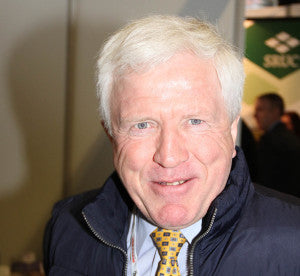Amenity Forum Question Time

The open panel debate on the Control of Weeds, Pests and Diseases in the Amenity Sector was chaired by John Moverley the Amenity Forum Chair and the panellists were Paul Singleton of Basis, Nick Von Westenholz of the Crop Protection Association, Will Kay of Languard and Leo de Montaigna of Foamstream.
Prior to the debate, there had been chance to post questions to the group which formed the basis for debate. The questions ranged from how to best police the amenity sector and did the panel think that all pesticides could be banned through public pressure to a discussion on what exactly constitutes an Integrated Approach and how to best inform and educate the public on what amenity pesticide use actually entails and why it is important. The group were unanimous on their replies for the majority of questions and proved yet again that, when it comes to best practice, the majority of us are singing from the same songsheet.
The group had an interesting discussion on what constitutes integrated management. It was the feeling of the panel that a lot could be gained from increased communication within Local Authorities to co-ordinate cleansing. There is perhaps a misperception that integrated management means the eradication of pesticide use where, in reality, it is one of a number of essential parts of the management arsenal.
Well timed herbicide application in conjunction with a good street cleansing programme could significantly reduce the requirement for additional herbicide applications, saving time and resources; so, it could be argued that the most effective tool of all is good communication. Used correctly, there will always be a need for pesticides, as often spraying is the most cost effective and practical option, however, we should not be scared to investigate and incorporate new technology into our management plans.
Again the questions was raised of how as an industry we reach out to all the untrained operators out there and those still not signed up to best practice initiatives such as NASOR. The panel felt that economic and commercial reasons are the real drivers here. Unfortunately, until Procurement Departments and those involved in contract specification start to request NASOR, or other evidence of best practice, it is unlikely that there will be a wholesale buy-in to the scheme.
The general consensus was that, as an industry, we need to be better ambassadors for what we do well. Sadly, there remains an element of untrained and poorly skilled workers within the grounds maintenance industry. Increased emphasis on training and continual development is essential to overcome this; there is also a need to educate the public and change the perception of what is involved in grounds maintenance.
The discussion about training then raised the issue of policing. As there are limited funds and resources for policing of poor practice. how do we raise standards and stamp it out? Again there is no quick fix for this issue and, as much as the industry can self police, there will always be an element of poor practice where the reward outweighs the risk. Until there are better drivers from contract specifiers and more punitive measures from enforcement bodies, it is almost certain an element of poor practice will remain.
Other questions raised by the debate included the perennial issue of the use by the public of home and garden products, and what effect this has on water and whether these users understood the full ramifications of poor pesticide application. Public opinion and knowledge was a strong theme throughout a number of the questions debated; one question posed to the panel asked if they throught that ultimately public pressure and politics, rather than research and fact, would lead to a complete ban on the use of pesticides.
The panel we largely optimistic that this would not be the case, but all stressed the need to engage with and educate the public on a range of issues around the use of pesticides.

Paul Singleton of BASIS wanted to see full implementations of the rules that are there already with better compliance and policing.
Will Kay of Languard, which is a large vegetation management contractor working on a number of local authority contracts, hoped for better public education and less scare tactics when it came to the use of pesticides in public places.
Leo de Montaigna of Foamstream, which supplies a hot foam and steam method of weed control, wished to see more money for research into alternative technologies to drive this sector of the industry forwards.
Finally, Nick von Westenholz of the Crop Protection Association echoed Will's wish to see more emphasis on evidence and facts rather than opinion and conjecture.
In summary, the debate could have quite happily gone on for another hour and many of the issues raised are ones we all come across regularly, I don't think many people would argue against the need for training, raising standards and better communication. These debates allow the industry to keep the message regarding best practice going, and hopefully it manages to reach new ears each time one of these events is held.
The Amenity Forum will be holding its Annual Conference on October 16th at Leicester City Football Club.
Vicki Wall, Technical Manager at Spray CDA www.spraycda.co.uk
